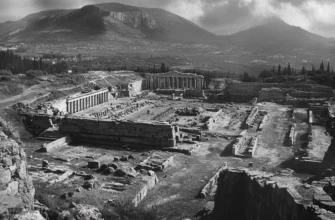During the era of slave-owning democracy, Athens was one of the most developed cities in Ancient Greece. The legal status of the population was determined by the political and legal institutions of the time. Citizens had certain rights and obligations, while slaves had no rights whatsoever. Legal acts were established to ensure order in the city and control the behavior of citizens. The legal status of the population had a significant impact on the social and economic development of the city.
Slavery-based democracy: political and legal institutions
Slavery-based democracy in Athens was based on political and legal systems that guaranteed a certain level of rights for citizens. One of the main institutions was the Ecclesia, a popular assembly where citizens gathered to discuss and pass laws and decisions. Another important institution was the Boule, a council composed of representatives of public organizations. The city was governed by the Archons, who were elected by popular vote and had the right to decide on military affairs, customs duties, court decisions, and other important issues. A police force was established to ensure law and order. Slavery was legal, and slaves had no political or legal status.
Rights and duties of citizens in a slave-owning democracy
In the slave-owning democracy of Athens, citizens had certain rights and duties. In particular, citizens had the right to participate in the Ecclesia and Boule assemblies, elect Archons, and hold government positions. They also had the right to legal protection and the opportunity to defend their rights in court. Citizens’ duties included military service and paying taxes. However, not all citizens had equal rights—women, slaves, and foreigners did not have the right to vote or hold government positions. Also, military service and duties depended on the status and property of citizens.
The influence of the legal status of the population on the social and economic development of Athens
The legal status of the population in Athens had a significant impact on the social and economic development of the city. The slave-owning system, which was based on the exploitation of slaves, contributed to the development of crafts and trade, which led to an increase in the city’s income. The creation of legal institutions that guaranteed a certain level of rights for citizens ensured stability and order in the city. Overall, the legal status of the population in Athens contributed to the creation of positive conditions for the economic and social development of the city, although the system of slavery restricted the rights and freedoms of certain categories of the population.
Conclusion
Legal status of the population. Slave-owning democracy in Athens it can be said that the legal status of the population in Athens during the slave-owning era played an important role in ensuring stability and order in the city, as well as contributing to the development of the economy and social welfare of the city. However, the system of slavery restricted the rights and freedoms of certain categories of the population, which emphasizes the need to protect human rights and fight for justice in society. Understanding the legal status of the population in the past can provide valuable experience for improving the rights and freedoms of people in the modern world.








